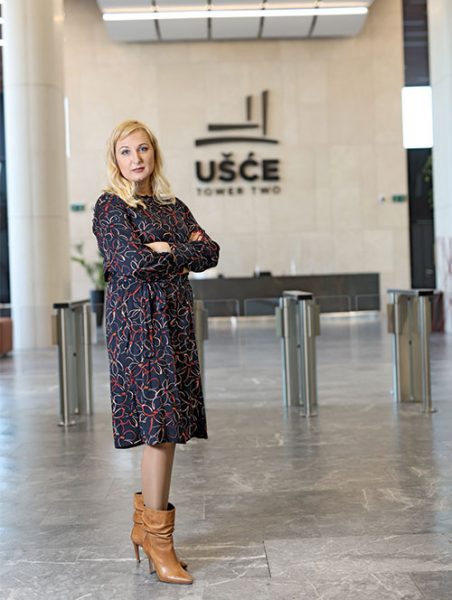Thanks to the clear defining of rules of conduct at work during the period of the pandemic, the lives and health of employees were preserved, while the actual operations of MPC Properties were improved thanks to reorganisation. Discussing all of this for CorD Magazine is MPC Properties HR Director Marina Matić
In the period that lies ahead of us, the HR sector will have a role that is extremely demanding, much more demanding than the one it previously had. It will be our job, among other things, to help people overcome their fears in a healthy way and to return to normal flows of life and work.
Working with people is neither easy nor simple even under the most normal circumstances, never mind under the conditions of a pandemic. How has MPC Properties dealt with this?

From the very outbreak of the COVID- 19 pandemic, we defined very clear rules of conduct, while keeping things under control implied a strong connection between the human resources sector, corporate security and all line managers, proach, which means that we approached each case individually, maintaining direct contact with each employee who is ill or under isolation, and monitoring the situation constantly. The percentage of those infected among our team has not exceeded 15 per cent of the total number of employees over the past year, which we consider a great thing that has helped us maintain the continuity of our operations.
Many companies offered people psychological assistance at the very beginning of the pandemic, while we considered that people should first be given an opportunity to grow accustomed to what was happening to us. They had to get used to us having to wear masks all day, to no more than three people being in the meeting room at the same time, but also to get used to various other restrictions. Then, after that initial shock has subsided, we introduced psychological support for employees, which they really use and which we will definitely continue providing.
Working from home is good, but only to a certain extent, because humans are social beings who have a need for social contact, and neglecting that is not good
Many companies had to reduce their number of employees and salaries. Did you also face this need?
We used the time of COVID to carry out a serious reorganisation of the company, and since November we’ve also had a new CEO. Apart from introducing changes at the highest level, we also looked to optimise certain things.
Some people are no longer with us, but we also sought to promote some exceptional people and provide them with an opportunity to find themselves in new, higher positions with new responsibilities, so that they could show their potential and continue developing in a business sense.
Working from home represented an exception prior to the pandemic, but it has now become an everyday norm for a year. Will that also be our future?
As a psychologist first and foremost, and not just as an HR specialist, I must emphasise that I don’t believe working from home will become a common thing.
Working from home is good, but only to a certain extent, because humans are social beings who have a need for social contact, and neglecting that is not good. I don’t believe that anything excessive is good. It is neither normal for us all to be in the office non-stop, which is something I thought even before the pandemic, nor for us all to now constantly work from home. It also isn’t good for us to succumb to a state of collective lethargy, where isolation and life without social contacts and interaction lead, because we aren’t even aware of how difficult it is to pull ourselves out of that later. I’m afraid that we’ll be forced to return to normality unless we find a healthy measure in everything during these days.
What are all the channels you utilise to communicate with employees?
We’ve strived from the very beginning to strengthen communication and to communicate all information – both related to the pandemic and everything else related to business – to everyone as transparently as possible. We’ve had one-on-one conversations with people who report having symptoms or contact with people suspected of being infected, while an “open door policy” is certainly something that’s characteristic of our HR team.
Our rules defined in such a way were accompanied by a flexible approach, which means that we approached each case individually, maintaining direct contact with each employee who is ill or under isolation, and monitoring the situation constantly
Due to the fact that more work was nonetheless done from home, we somewhat pushed communication by email, in order for us to reach everyone, and at the end of the year we organised an online town hall meeting at which we shared some important information about our operations with employees. As of March we’re introducing something called ‘the team of ambassadors of organisational values’, where a team of 15 people from different sectors of the organisation will, once a month, discuss ways to improve communication and transparency within the scope of our organisation.
